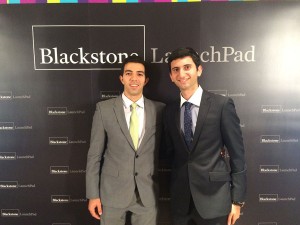Student-founded Bread & Butter aims to aid needy
American supermarkets, restaurants and other food retailers fail to donate, on average, 82 percent of their viable, unused food at the end of each day. American supermarkets, restaurants and other food retailers waste, on average, a shocking 45 percent of their daily food inventory. On average, U.S. supermarkets alone throw out $41 million worth of fruits and vegetables every day and, at any given supermarket, $2,300 worth of seafood, meat and dairy products will end up in the dumpster.

Team effort · USC students Etai Evenhaim and Jordan Banafsheha worked with co-founder Maor Chasen to develop the app at a hackathon. They were passionate about the concept so they pursued the project afterwards. – Photo courtesy of Jordan Banafsheha
USC students Etai Evenhaim, a junior majoring in business administration, and Jordan Banafsheha, a sophomore majoring in computer science and business administration, have witnessed the effects of food insecurity firsthand and, upon learning that so much food goes to waste, realized they could be part of a much needed change and created Bread & Butter, a platform to connect food retailers to underserved communities and nonprofits for the distribution of excess food.
“It’s all around us, especially at USC, and we decided we could do something that might be able to relieve some of that,” Banafsheha said.
Evenhaim, who witnessed the trials of a friend in high school who faced food insecurity, and Banafsheha, who grew up surrounded by homelessness, joblessness and food insecurity in Los Angeles, worked alongside co-founder Maor Chasen last June at a Tel Aviv hackathon to develop Bread & Butter. As the three collaborated to discuss ideas for their hackathon project, Evenhaim was particularly passionate about helping communities and people beset by food insecurity and suggested they try to create an app to do just that.
Evenhaim and Banafsheha wanted to facilitate a project that would not only help communities but also be a viable busines venture. Luckily, after a bit of research, the team discovered that retailers get tax credit for any food they donate. Thus, Bread & Butter was born.
The team went on to win the hackathon with the first version of their idea, and afterward, they decided to continue their work on it. They brought the app to Los Angeles, where Evenhaim and Banafsheha are based, but continue to collaborate with Chasen, who lives in Jerusalem.
“The ideas that are created [at hackathons] don’t usually turn into businesses, but we were really passionate about the idea and decided to keep going with it, especially once we noticed an inefficiency in the interaction between nonprofits and food retailers and saw an opportunity for great business,” Banafsheha said.
The main obstacles in their endeavor came in the form of logistical issues — retailers get tax receipts for their donations, but the paperwork associated with the receipts is tedious and difficult for businesses to complete, so most don’t bother with it and throw away their food. Bread & Butter aims to be a platform for these businesses, connecting them with nonprofits for easy donation and helping to complete their tax receipt paperwork for simpler filing and incentives. Participating businesses will also receive official certificates to display (think Zagat rating stickers) so patrons know a restaurant is donating.
Bread & Butter’s most integral component is the app, which connects retailers with available food to nonprofits and shelters in need. Retailers can list their available food at the end of the day; these listings become immediately available to nonprofits that can then claim any food they will use and go pick it up.
Restaurants can also choose not to donate their food when they think the amount is too small to help shelters. Bread & Butter is tackling this challenge by adding technology that will create efficient routes for nonprofits. As businesses list their donations on the app, it creates routes for nonprofits to follow to provide maximum donation potential for both the retailers and the nonprofits who can visit multiple retailers in one route and receive as much food as possible.
As Bread & Butter expands and grows — the beta version will launch in a couple of weeks — Evenhaim and Banafsheha want to bring USC into its mix as well. The Bread & Butter team has approached USC Hospitality to get all 40 of USC’s dining halls and food retailers on board with the program.
According to Banafsheha, shelters around Los Angeles are so lacking in resources and donations that they often have to buy food, spending what little money they have on food for their inhabitants instead of on infrastructure improvements, repairs or hiring more staff. Bread & Butter’s goal of providing more food to shelters and nonprofits in need would allow them to spend their already limited resources on more and improved amenities for the communities they serve. This will provide widespread benefits — not only will it ameliorate shelters, but it will strengthen relationships within communities and equip more people with the food they need to survive.
The app’s beta version will launch with partners Bacaro and Nature’s Brew in order to work out any kinks and get en vivo feedback before its official launch in the next few months. The final version of the app will be up and working for nonprofits and for the two initial retailers as the Bread & Butter team continues to add retailers and cater to more nonprofits in need. The team hopes to reach as many Los Angeles restaurants as possible on the platform in the next year before hiring more staff and expanding to other major cities.
“We wanted to help people and start right where we live,” Banafsheha said.

